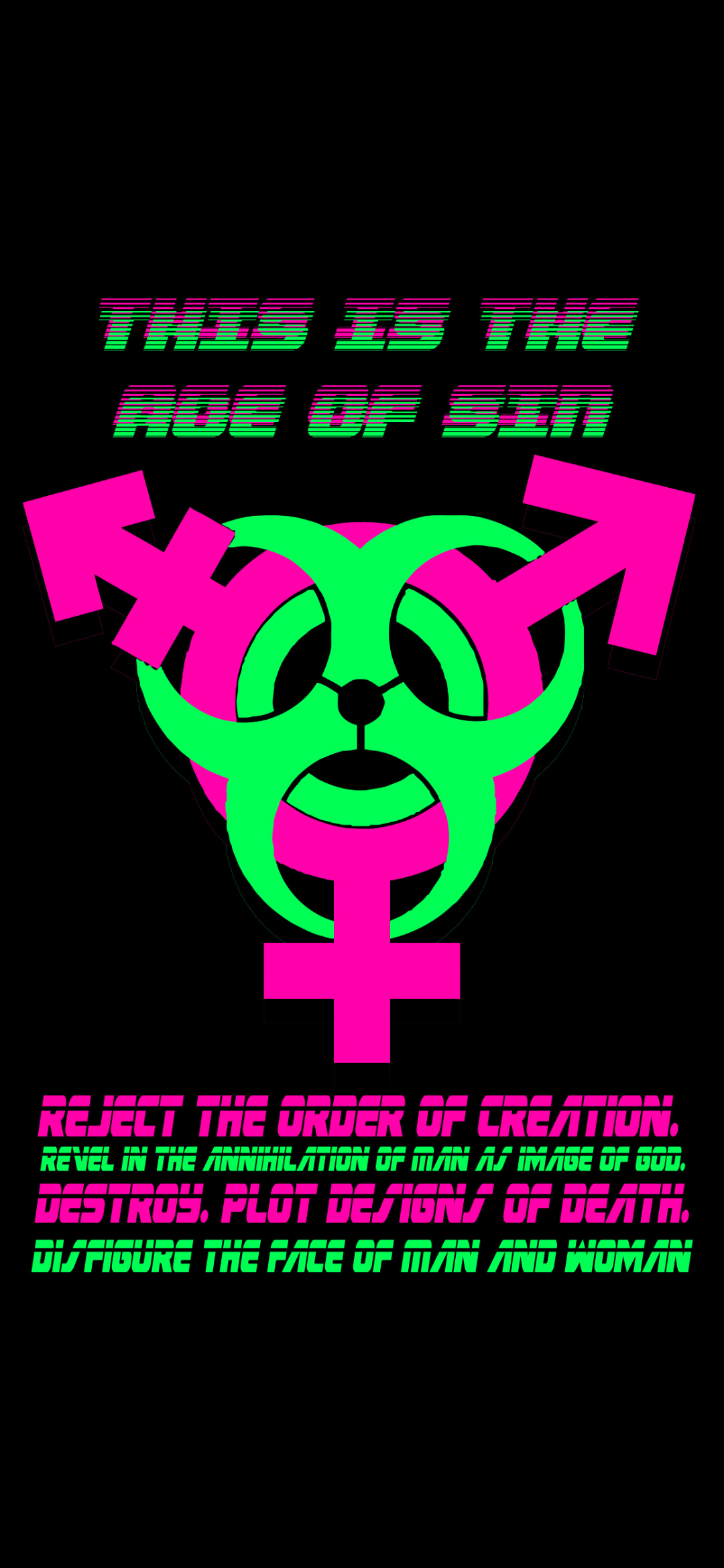I can think of some obvious examples to start with, but my subtle but insidious nominee is Fable III. Fittingly for a pretentious grifter like Molyneux, the game requires you to raise a specific amount of gold or your kingdom is destroyed and you get a bad ending. The goalposts are moved by the game if you raise money in ways it doesn’t approve of, and it is simply impossible to reach the fundraising goal in any way that isn’t at least Enlightened Centrist levels of evil, the kind that lanyard-wearing neoliberals giggle about. That’s right, you need to be at least this evil or your kingdom is destroyed. So deep and really makes you think about the hard decisions that are made by the ruling class, doesn’t it? :zizek:
The Last of Us 2
Neil Druckmann was raised in Israel and has stated that the game’s “cycle of violence” theme is modeled after his understanding of the Israel-Palestine conflict. The game both-sides the conflict between the main factions, making you switch perspectives between the two main characters repeatedly.
The ending of that game for me was a drudge. I was invested so I kept playing, but emotionally I just wanted it to be over and I had a feeling very similar to watching someone self destruct their life and knowing you can’t stop them. I felt pity and sadness and frustration. Apparently that was not the intended effect:
“I landed on this emotional idea of, can we, over the course of the game, make you feel this intense hate that is universal in the same way that unconditional love is universal?” Druckmann told the Post. “This hate that people feel has the same kind of universality. You hate someone so much that you want them to suffer in the way they’ve made someone you love suffer.”
I suspect that some players, if they consciously clock the parallels at all, will think The Last of Us Part II is taking a balanced and fair perspective on that conflict, humanizing and exposing flaws in both sides of its in-game analogues. But as someone who grew up in Israel, I recognized a familiar, firmly Israeli way of seeing and explaining the conflict which tries to appear evenhanded and even enlightened, but in practice marginalizes Palestinian experience in a manner that perpetuates a horrific status quo.
“cycle of violence” theme is modeled after his understanding of the Israel-Palestine conflict
understanding
:chesus:
Been thinking a lot about the ideology of Chess recently. The game goes back to ancient India and was designed to teach young men about army tactics. So in a way it was a bit like how COD prepares young men to join the military.
It changed into it’s modern form in Spain, where it traveled with Islam and was adopted by the spanish. I believe the original pieces represented infantry (pawns), cavalry, chariots(bishops) and elephants (rooks). The “queen” was then male and considered the “advisor” and moved like the king. Just as Isabela became the most powerful queen in the last 500 years of Europe, the advisor was changed to queen and the became the most powerful piece. Pawns also got their ability to become queens, which, being called “promotion” may be a reference to the original role as “advisor” but may also reflect a king’s ability to marry anyone and therefore make them a powerful queen. It was also during this time that the diagonal piece was named the “bishop,” representing the power of the church and flanking the monarchy, closer even than the knights to the king and queen.
This is all to be expected, I guess. What I find insidious about the game is simply the “black vs. white” color scheme. Could it have been lost on the Spanish that their skin color was lighter than the Muslims they fought? Is it lost on modern players that the white pieces are superior to the black (white has the advantage of going first and therefore is more likely to win)?
Another subtly insidious aspect is the widespread understanding that the computer knows better than humans. People who are good at chess are thought of as smart, therefore, even smarter is an AI that can beat the best players. Because the rules of chess are simple and the goal of checkmate is concrete the AI has an exact purpose and can be trusted to seek that purpose. The AI is therefore “always right.” This might produce in players a habit of deferring to computer generated models, forgetting that in real life the purpose and limits of a computer program can vary wildly and are set by it’s creator
This is all to be expected, I guess. What I find insidious about the game is simply the “black vs. white” color scheme. Could it have been lost on the Spanish that their skin color was lighter than the Muslims they fought? Is it lost on modern players that the white pieces are superior to the black (white has the advantage of going first and therefore is more likely to win)?
Careful with applying modern American interpretations of race to medieval Spanish history. Ain’t very historical materialist.
It’d be a good research topic though.
XCOM: Chimera Squad. 👏 More 👏 xeno 👏 SWAT 👏 teams 👏
All problems can be solved by kicking in the door guns blazing. Don’t have any evidence? Don’t worry, if you bust in and kill everyone, maybe you’ll find some!
We’ve fought long and bitterly against our subjugation. Now that humanity has access to literal space-age technology, we can grow as a united civilization to great heights!
Wait, it’s just the same as before but with aliens? Okay then…
I mean, the “worst” are the ones that have natsec money behind them and are insidious propaganda tools, see Call of Duty. The only reason there shouldn’t be a push to have that series halted completely is that it would be incredibly alienating to normal people. Otherwise, there’s rich history of outwardly reactionary games to choose from. Freedom Fighters is Red Dawn if it didn’t suck. 2044 AD is literally the femnazi game.
My personal least favorite’s probably Ronaldo’s ending in Devil Survivor 2. The writer’s brains are so steeped in liberal ideology. In this ending, the MC uses demon shit to create heaven on earth. Not “angels strip you of humanity and you worship YHVH all day”. They outright call it a paradise where everyone lives for each other, where people live for each other, basically skipping to whatever would come after communism. It’s presented with being on the same level as the ending where some blueblood loser (who starts off with magical shit) rules over a world of constant violence and death. The good ending is restoring Tokyo to the way it was, except your friends are personally better off in specific situations, I guess.
Sounds like how the most recent Evangelion series ended. :desolate:
well at least that has an excuse
the excuse being that they were always gonna be shit, and existed because of a combination of Anno’s hate and desire for more tokusatsu merch. Sure, they were cynical and empty, but don’t you want Anno to own the original Kamen Rider Cyclone?
I figured the old endings did enough, but even they weren’t enough to shut up the “Rei is the perfect waifu because her virginity can be taken over and over again and you can reset her virginity with each clone” terrifyingly creepy members of the fandom that existed even back then.
Riskiest click I’ve ever seen on Hexbear. :bugs-no:
ok understandable
House Flipper just serves to normalize the idea of housing as a commodity. In a vacuum it is not the worst game, in fact it is quite competent though.
Company of Heroes 2 which portrays the USSR as evil for conscripting its people to fight in die in a “pointless” war to… checks notes …defend itself from an army hellbent on waging a war of extermination against it. But that’s just low-hanging fruit.
For something more subtle, I’d say most games that lament the “Evils of Humanity” feel pretty reactionary. The idea that something bad is inherent to humans (war, crime, bigotry, corruption, etc) and we just have to learn to accept it, without any other investigation into the matter. One game that comes to mind is Shin Megami Tensei: Strange Journey Redux where
spoiler
the new ending has the main character turn immortal and get stuck into an endless cycle of needing to purge the Dark World over and over again because humanity cannot stop its self-destructive tendencies. Keep in mind that this is supposed to be an allegory for climate change.
Hearts of Iron: Nazi whitewashing. Nazi fantasy simulator. Goddamn fucking Nazi fanbase.
Europa Universalis: Colonial Nazi simulator with religious persecution button, Pogrom button, slave trading button, honestly more offensive than HOI because all the atrocity is extremely normalised and in fact optimal play
Red Alert is pretty bad as the Soviet Union gets hit hard with the villain bat.
Outer Worlds is also bad. Present a capitalist hellscape with anarchist and communist factions, and everything other than mild succdem stuff fails.
Red Alert 1 having Stalin as some expansionist warmonger is hilarious if you actually, you know, read history.
They should have gone for Trotsky instead. Even if that would be a hyperbole of his ideology, he would at least fit more.
The Soviet campaign in Red Alert turned me!
I mean, they’re the more fun faction, but they are also depicted as imperialists who love killing civilians.
Also, it makes Einstein into a lib.
True.
the USSR in red alert is a villain in the same way Dr Robotnik is
sure they’re the bad guys but like, they absolutely rock
I recently played C&C Generals, thought the ideology there isn’t “subtle but insidious”, but rather just hilariously blatant.
Dr anthrax is the best character ever made
I love the Wargame series, and its sister series Steel Division manages to avoid a lot of the most common myths about the Soviet Union circa World War II, but god damn does Eugen Systems have serious brain worms.
Here are the campaigns in Wargame: Red Dragon:
- The South Korean dictatorship opens fire on a student protest, sparking a massive wave of unrest. This prompts North Korea to invade, and you play as the Americans who push back the Northerners and defend the dictatorship that was literally just massacring college students.
- The Soviet Union invades China in response to China attacking Vietnam. You play as China, and lead a counterattack that captures Vladivostok, successfully defending the Khmer Rouge.
- The time has come for Hong Kong to be handed over to China, but after Den Xiaoping makes a somewhat flippant remark to Margeret Thatcher, she decides that she doesn’t want to give up Hong Kong after all. You play as the Br*ts and fight to maintain control of your colonial holdings.
- The Soviet Union of 1984 grows paranoid about an impending American/Japanese attack to take some disputed islands, and launches a preemptive invasion of mainland Japan.
- The CPSU successfully coups Gorbachev right before he dissolves the Soviet Union. Despite the Soviet Union barely hanging on after the defection of several Eastern European republics, North Korea decides that this is the perfect chance for reunification, and kicks off the Second Korean War.
Earlier games in the series posited a Soviet invasion of Germany across the Fulda Gap. It’s like someone made a list of every single thing that the Cold Warriors were wrong about and made fanfiction of them actually being right.
Portrayal is endorsement, so Disco Elysium is obviously a nazbol centrist hyper-capitalist game.
Dishonored.
Don’t get me wrong, I love all the Dishonored games (Death of the Outsider is my favourite), but there is a deeply liberal undercurrent to the series.
Both mainline games are about getting rid of the bad aristocratic tyrant and replacing them with the “good” and “rightful” heir to the throne of Dunwall. The most telling part of this is the conflict between the Abbey of the Everyman and any supernatural covens/gangs like the Bridgemoore witches or Daud’s Whalers.
Both the Whalers and the witches have specific complaints within society; the Whalers are comprised of former gang members and disenfranchised labourers radicalised by the inequality in Dunwall, whereas the Bridgemoore witches are a radical feminist movement. Conversely the Abbey of the Everyman is a calvinist cult that carries out brutal crackdowns of anyone perceived to be a witch. Despite this the Abbey of the Everyman is consistently framed as being terrible but still the lesser evil. The Overseers essentially fall into the “woke” liberal defence of policing, “Yeah sure they’re bad, torturing and murdering randos and all that. But what are you gonna do if a witch turns up and starts killing people? That’s why we need more Overseers and they need to be increasingly militarised.”
When Delilah Copperspoon takes control of Dunwall and thus the Empire of the Isles, the Bridgemoore witches begin committing mass murder on the streets because… I don’t know they’re the baddies.
Time and time again the series shows any attempt to change the status quo resulting in pointless bloodbaths and mindless chaos, a status quo that need I remind you is a combination of Dickensian squalor and the Spanish inquisition.
Any changes that happen for the better, happen within the confines of the system. The miners union is the one group that is shown to be uncomplicatedly good, but even they are ineffective in timelines where the duke owns the mine because the union is only using peaceful protest. A kinda washed down vision of historical labour struggles.
The series is deeply critical of the aristocratic class. Every entry in it depicts them as selfish hedonists who’ll bleed a beggar to death if they think it will get them a good high at best, and brutal eugenicists willing to let a disease ravage the population in order to get rid of “undesirables” at worst. But this criticism falls weak when the right answer time and time again is always “replace the bad toffs with good toffs”.
The system isn’t a problem it’s the people, in other words.
Sim City 4 has the player actively valuing rich residence over poor ones and they have to set taxes lower for rich residents.
There’s a similar class system element in one of my favorite city building games, Foundation, where higher level citizens need more luxury goods and better property values to be satisfied compared to the low level serfs that you can pretty much exploit to your pleasure as long as you have a strong church presence. I love it though, it’s an interactive peer into the political economy of the feudal period. The end game is the beginnings of a proto-capitalist society and I’ve seen complaints from players online that it’s nearly impossible to manage the logistics of the economy after that point but that’s great because in real history this creates the need for bureaucracy to manage those logistics rather than relying on a centralized power figure like under feudalism. It’s a really fun little educational tool in its own way. Honestly my biggest complaint is that the game is fully gender neutral for which jobs you assign the peasants too which I feel like is a miss if you’re trying to show how the economics of the medieval period worked. Maybe the creators aren’t being that intentional tho
It’s funny in both situations the games correctly display the horrifying economic stratification present in our economic systems but because the Sim City devs live under liberalism their brains are drenched in liberal ideology so they see these disparities as either good or “unavoidable” but either way immutable and natural to how economics should work
Bioshock Infinite.
The city of Columbia was built as a haven for the ruling class of 1800s America. Complete with a white underclass and, of course, slaves. It was built by a scientist who discovered a new technology and was to serve as a floating World’s Fair showing the world how great and advanced America is. Pretty okay premise if done right. Many opportunities to talk about real history and draw comparisons to today. The city is politically divided among several factions, which isn’t a fleshed out mechanic in the game due to development issues. But you have a cult that worships John Wilkes Booth and hates Lincoln for ending slavery. You have people who are hyper religious and treat the Founders as religious prophets. You have normal upper middle-class people who are tuned out to the politics. You also have the revolutionary group Vox Populi who are trying to overthrow Columbia’s government and install actual democracy. Again, some great ideas in there for good stories based in real history. But then somewhere towards the end of the game it makes the Vox Populi just as bad as the imperialist, racists, sexists, zealots. When you start the game there is a couple being physically abused for miscegenation, in front of a cheering crowd. Yet the black lady trying to stop it is bad because her and other workers killed some cops and are pushing the middle class white people out of the city. It’s total “both extremes are really the same” kind of thing. And to make the revolutionary leader bad they write her to kill a baby or something? It’s been a while I can’t remember if she tries to kill Elizabeth or just Comstock. She was also going to use Columbia’s weapons and invade NYC to liberate people on land too. But that’s bad because NYC in the late 1800s/early 1900s was good.
Some people might bring up the development troubles as a reason the story got so simplified into horseshoe theory. But there are early gameplay videos from before the troubles started that show Vox Populi implying they want to sexually assault Elizabeth. So they meant for them to be bad from the beginning. The only real thing that was different was that Comstock was supposed to me more nuanced. So the people’s revolution of communists were pretty much always a political cartoon and they had to jam the right wing factions into one guy. Instead of getting the subtleties of “cleanse all the immigrants” from many different factions, we get it from one guy. Thanks 2k/Irrational.
Ken Levine is a fucking hack and always has been. Keep him away from games.
In Shadow Hearts: Covenant, you pal around with a goddamned Romanov.
And fight the ancient sorcerer Lich version of Grigori Rasputin from the 90’s cartoon. The presence of a talking bat in this game is coincidental and completely unrelated.








